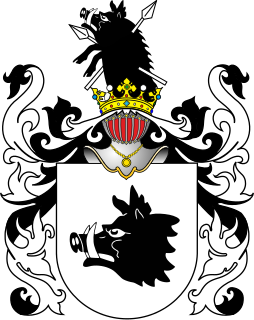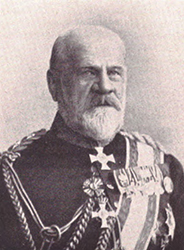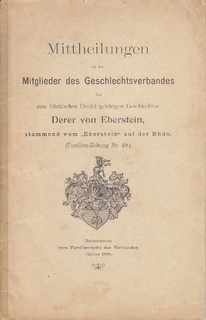
The Swedish nobility has historically been a legally and/or socially privileged class in Sweden, and part of the so-called frälse. The archaic term for nobility, frälse, also included the clergy, a classification defined by tax exemptions and representation in the diet. Today the nobility does not maintain its former privileges although family names, titles and coats of arms are still protected. The Swedish nobility consists of both "introduced" and "unintroduced" nobility, where the latter has not been formally "introduced" at the House of Nobility (Riddarhuset). The House of Nobility still maintains a fee for male members over the age of 18 for upkeep on pertinent buildings in Stockholm.
Generalfeldmarschall was a rank in the armies of several German states and the Holy Roman Empire (Reichsgeneralfeldmarschall); in the Habsburg Monarchy, the Austrian Empire and Austria-Hungary, the rank Feldmarschall was used. The rank was the equivalent to Großadmiral in the Kaiserliche Marine and Kriegsmarine, a five-star rank, comparable to OF-10 in today's NATO naval forces.

Carl Friedrich Heinrich Reinhard Scheer was an Admiral in the Imperial German Navy. Scheer joined the navy in 1879 as an officer cadet; he progressed through the ranks, commanding cruisers and battleships, as well as major staff positions on land. At the outbreak of World War I, Scheer was the commander of the II Battle Squadron of the High Seas Fleet. He then took command of the III Battle Squadron, which consisted of the newest and most powerful battleships in the navy. In January 1916, he was promoted to Admiral and given control of the High Seas Fleet. Scheer led the German fleet at the Battle of Jutland on 31 May–1 June 1916, one of the largest naval battles in history.

Freiherr, Freifrau and Freiin are designations used as titles of nobility in the German-speaking areas of the Holy Roman Empire, and in its various successor states, including Austria, Prussia, Bavaria, Liechtenstein, Luxembourg, etc. Traditionally it denotes the titled rank within the nobility above Ritter (knight) and Edler and below Graf and Herzog (duke). The title superseded the earlier medieval form, Edelherr.

Unrestricted submarine warfare is a type of naval warfare in which submarines sink vessels such as freighters and tankers without warning, as opposed to attacks per prize rules. Prize rules call for submarines to surface and search merchantmen and place crews in "a place of safety" before sinking them, unless the ship showed "persistent refusal to stop ... or active resistance to visit or search". During the First World War, the British introduced Q-ships with concealed deck guns, and armed many merchantmen, leading the Germans to ignore the prize rules; in the most dramatic episode they sank Lusitania in 1915 in a few minutes because she was carrying war munitions. The U.S. demanded it stop, and Germany did so. Admiral Henning von Holtzendorff, chief of the Admiralty staff, argued successfully in early 1917 to resume the attacks and thus starve the British. The German high command realized the resumption of unrestricted submarine warfare meant war with the United States but calculated that American mobilization would be too slow to stop a German victory on the Western Front.
Grand admiral is a historic naval rank, the highest rank in the several European navies that used it. It is best known for its use in Germany as Großadmiral. A comparable rank in other navies is that of fleet admiral.

Joachim Wilhelm Franz Philipp von Holtzendorff, German jurist, born at Vietmannsdorf, in the Mark of Brandenburg, was descended from a family of the old nobility.

Denhof - is a Polish coat of arms. It was used by several szlachta families in the times of the Polish-Lithuanian Commonwealth. Dönhoff (German) or Denhoff (Polish) was a Livonian German noble family, a branch of which moved to the Polish-Lithuanian Commonwealth in the 16th century and became recognized as a Polish noble (szlachta) there.

Henning Rudolf Adolf Karl von Holtzendorff was a German admiral during World War I, who became famous for his December 1916 memo about unrestricted submarine warfare against the United Kingdom. He was a recipient of Order of the Black Eagle and the Pour le Mérite with oak leaves and was one of just six Grand Admirals of the Imperial German Navy.
The term von [fɔn] is used in German language surnames either as a nobiliary particle indicating a noble patrilineality, or as a simple preposition used by commoners that means of or from.

The Austrian nobility is a status group that was officially abolished in 1919 after the fall of Austria-Hungary. The nobles are still part of Austrian society today, but they no longer retain any specific privileges. Austria's system of nobility was very similar to Germany's, as both countries were previously part of the Holy Roman Empire (962-1806).
The German nobility and royalty were status groups which until 1919 enjoyed certain privileges relative to other people under the laws and customs in the German-speaking area.
The 42nd Division was a unit of the Prussian/German Army. It was formed on October 1, 1912, and was the last regular division created in the Imperial German Army. It was headquartered in Saarburg in Lothringen. The division was subordinated in peacetime to the XXI Army Corps. The division was disbanded in 1919 during the demobilization of the German Army after World War I. The division was primarily recruited in the Rhine Province and the Province of Westphalia, as the German population in Alsace-Lorraine was insufficient to fill the division.
Joachim Friedrich von Blumenthal (1606–1657) was a German nobleman. He was a diplomat and the founder of the Brandenburg-Prussian Army.

Amsberg is the name of a German noble family from Mecklenburg. A great-grandson of a blacksmith, parish pastor August Amsberg (1747–1820) started calling himself "von Amsberg" in 1795 and the family's right to use this name was confirmed by the Grand Duke of Mecklenburg-Schwerin in 1891. By this permission to use a noble privilege, the family effectively became part of the untitled lower nobility of the Grand Duchy of Mecklenburg-Schwerin. The present King of the Netherlands, Willem-Alexander is an agnatic member of this family.
The Ministry of War of Saxony was a government ministry of the Kingdom of Saxony that existed from 1831 to 1919. It subsequently briefly existed as the Ministry of Defence in the Free State of Saxony from 1918 until 1919, when the new Weimar Constitution of Germany provided for the replacement of all state ministries of defence by the Federal Ministry of Defence.
Events in the year 1919 in Germany.

Junker is a noble honorific, derived from Middle High German Juncherre, meaning "young nobleman" or otherwise "young lord". The term is traditionally used throughout the German-speaking, Dutch-speaking and Scandinavian-speaking parts of Europe. It also was used in the Russian Empire due to Baltic German influence, up until the Russian Revolution.

Born into an aristocratic Prussian family, Albert Gustav Guido von Rauch was a general of the infantry in the Prussian Army who fought in the Austro-Prussian War and Franco-Prussian War. He was born in Berlin to Gustav von Rauch, former Prussian Minister of War and as his son general of the infantry, and his second wife Rosalie, née von Holtzendorff (1790-1862). His grandfather was Major General Bonaventura von Rauch. His brothers were General of the Cavalry Gustav Waldemar von Rauch and the Prussian chief equerry Fedor von Rauch. His half-brother was the Hofmarschall and chamberlain Adolf von Rauch and his sister Rosalie Countess von Hohenau, morganatic wife of Prince Albrecht of Prussia, the youngest brother of King Frederick William IV of Prussia and William I, German Emperor.
Events from the year 1853 in Germany.













